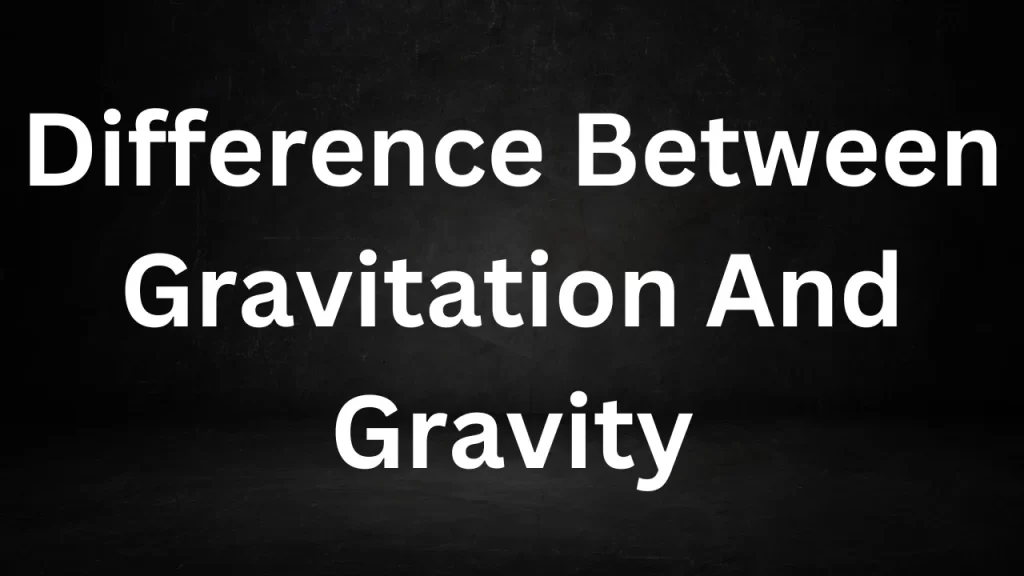Difference Between Gravitation And Gravity: Gravitation and gravity are two terms often used interchangeably, but they have distinct meanings and implications in the realm of physics and science.
Understanding the difference between them can help clarify their roles in the universe:

Difference Between Gravitation And Gravity
1. Definition:
- Gravitation: Gravitation is a fundamental force of nature that describes the attraction between all objects with mass or energy. It is a universal force that governs the motion of celestial bodies and objects in the cosmos. Gravitation is responsible for phenomena such as planetary orbits, the falling of objects, and the behavior of galaxies.
- Gravity: Gravity is a specific manifestation of the gravitational force on Earth. It is the force that pulls objects with mass toward the center of the Earth and gives them weight. Gravity is a subset of gravitation, applying specifically to objects near the Earth’s surface.
2. Scope:
- Gravitation: Gravitation applies universally to all objects with mass or energy in the universe. It is responsible for the motion of planets, moons, stars, and galaxies, as well as the behavior of celestial bodies on a cosmic scale.
- Gravity: Gravity specifically applies to objects on or near the Earth. It accounts for the force of attraction that objects experience due to the Earth’s mass. Gravity’s influence extends to the Earth’s immediate vicinity and is responsible for phenomena like falling objects.
3. Examples:
- Gravitation: Gravitation explains the orbits of planets around the Sun, the gravitational interactions between celestial objects, and the formation and behavior of galaxies. It encompasses the entire spectrum of gravitational forces in the universe.
- Gravity: Gravity explains why objects fall when dropped, why we feel weight when standing on the Earth’s surface, and how objects interact with the Earth’s gravitational field. It is the specific force that keeps us grounded.
4. Application Beyond Earth:
- Gravitation: Gravitation operates universally throughout the cosmos. It applies to all celestial bodies and objects in the universe, influencing their behavior and motion.
- Gravity: Gravity is specific to Earth and its immediate surroundings. While other celestial bodies have their own gravitational fields, “gravity” typically refers to the force experienced on Earth.
5. Scientific Study:
- Gravitation: Scientists study gravitation to understand the behavior of celestial bodies, cosmological phenomena, and the structure of the universe. It encompasses a wide range of gravitational interactions on cosmic scales.
- Gravity: Gravity is studied primarily in the context of Earth and its gravitational field. Research on gravity includes understanding its effects on objects and the principles of gravitational acceleration.
In summary, gravitation is the overarching concept of the gravitational force that exists between all objects with mass or energy in the universe. Gravity is the specific manifestation of this force on Earth, responsible for the weight we feel and the motion of objects on our planet. While gravitation is a universal and cosmic force, gravity is the Earth-specific application of that force.
Read More
- Molecular Weight Of H2SO4
- Distance Time Velocity Time Graph
- Difference Between Kinetics And Kinematics
- Changing States Of Matter Class 9
- Average Speed And Average Velocity Class 9
Frequently Asked Question (FAQs) Difference Between Gravitation And Gravity
What is gravitation, and what is gravity?
- Gravitation: Gravitation is a fundamental force of nature that describes the attraction between all objects with mass or energy. It operates universally in the cosmos and governs the behavior of celestial bodies.
- Gravity: Gravity is a specific instance of gravitation that refers to the force of attraction between objects on or near the Earth’s surface due to Earth’s mass. It is a subset of gravitation, applying to Earth-bound scenarios.
Are gravitation and gravity the same thing?
No, they are related but not the same. Gravitation is the general concept of the force of attraction between objects with mass, and it applies universally. Gravity, on the other hand, specifically refers to the gravitational force experienced on or near Earth.
Can you provide an example of how gravitation operates beyond Earth?
Gravitation explains the orbits of planets around the Sun. It also governs the gravitational interactions between celestial objects, such as stars in galaxies, and shapes the structure of the entire universe.
How does gravity work on Earth?
Gravity is the force that pulls objects with mass toward the center of the Earth. It is responsible for objects falling when dropped, and it gives weight to objects based on their mass and the strength of Earth’s gravitational field.
Is there a difference in the scope of gravitation and gravity?
Yes, gravitation has a universal scope and applies to all objects with mass or energy in the universe. Gravity, on the other hand, applies specifically to objects on or near Earth.
